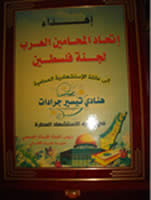1. A delegation of four lawyers from the Arab Lawyers Union (ALU) went to Jenin on October 12 to hold a ceremony to mark the anniversary of the death of suicide bomber Hinadi Jaradat. She belonged to the Palestinian Islamic Jihad (PIJ) and carried out a suicide bombing attack in the Maxim restaurant in Haifa, killing 21 Israeli civilian and wounding about 50, on October 4, 2003.
2. The ceremony was held in the family's home on October 13. The ALU delegation expressed its pride in and appreciation for the attack by presenting the family with a framed plaque. The family also received congratulations from the chairman of the ALU, Omar al-Zaban, and the chairman of the ALU's Palestine Committee, Sayed Abd al-Ghani. According to lawyer Ayman Abu Aisha,[1] a delegation member from the ALU's Palestine Committee, the Committee had decided to award the family with the plaque during a meeting held in Cairo on September 8, 2012 (Al-Ayam, October 3, 2012).
3. Presenting the family with a plaque was another example of turning terrorists into role models for Palestinians and the Arab-Muslim world in general. A book of poems about Hinadi Jaradat was issued in 2005, published in her honor by the Palestinian Authority. At the time it was chosen as book of the month by the Palestinian's ministry of culture (Al-Ayam, August 22, 2005).
4. Throughout the PA it is customary to glorify the names and actions of terrorist operatives who carried out showcase terrorist attacks such as suicide bombings. Streets are named after them, as are town squares, schools, cultural institutions and summer camps for Palestinian children. For example, in March 2010 a town square in the center of Ramallah was named for Dalal al-Magribi, the terrorist operative who was involved in the notorious Coastal Road Massacre in 1978.[2] In April 2010 Ramallah's main street was named for Yehya Ayash, one of the founders and heads of the Izz al-Din al-Qassam Brigades, Hamas' military-terrorist wing, who was responsible for suicide bombing attacks in which scores of Israeli civilians were murdered and hundreds wounded.[3]

The plaque presented to Hinadi Jaradat's family by the Arab Lawyers Union. It reads, "Presented by the Arab Lawyers Union/Palestine Committee to the family of the suicide bomber [terrorist], the lawyer Hinadi Jaradat, to commemorate the day she carried out the suicide bombing attack.[4] [Signed] Sayed Abd al-Ghani, Lawyer, head of the [Palestine] Committee chairman" (Hamas forum, October 13, 2012).
5. The Arab Lawyers Union is an NGO founded in 1944. Its headquarters are located in Cairo, Egypt. It is an umbrella organization for lawyers from 15 Arab-Muslim states (including "Palestine") and 27 organizations, and has more than 200,000 lawyers as members. The ALU is an advisory board to both the UN's Economic and Social Council and UNESCO. It is also a member of the lawyers' union of the International Criminal Court (ICC), and belongs to the French International Union of Lawyers and the International Legal Assistance Consortium (See Appendix II).
[1] Ayman Abu Aisha is a lawyer from the Gaza Strip, a graduate of the Gazan Al-Azhar University's law school. In 2011 he tried to leave the Gaza Strip twice through the Rafah crossing but was refused exit because his name appeared on a list of people Egyptian General Intelligence had forbidden to enter the country (Al-Jazeera, January 1, 2011). In February 2012 he went on a hunger strike in solidarity with Adnan Khader, a Palestinian Islamic Jihad terrorist operative in Judea and Samaria who was on a hunger strike in an Israeli jail (Palestine News Network, February 15, 2012).
[2] For further information see the March 21, 2010 bulletin "Turning Shaheeds in Role Models: Fatah unofficially inaugurated the Dalal al-Magribi Square in Al-Bireh, named after a Fatah terrorist who participated in the mass-murder attack on Israel's Coastal Road (1978)."
[3] For further information see the April 11, 2010 bulletin "The Palestinian Authority still allows and even encourages shaheeds to be turned into role models."
[4] Al-istishhadiya in Arabic. The term istishhady means "suicide bomber who died during the conflict with Israel." For further information see the December 25, 2005 bulletin " Suicide bombing terrorism during the current Israeli-Palestinian confrontation (September 2000-December 2005)."











